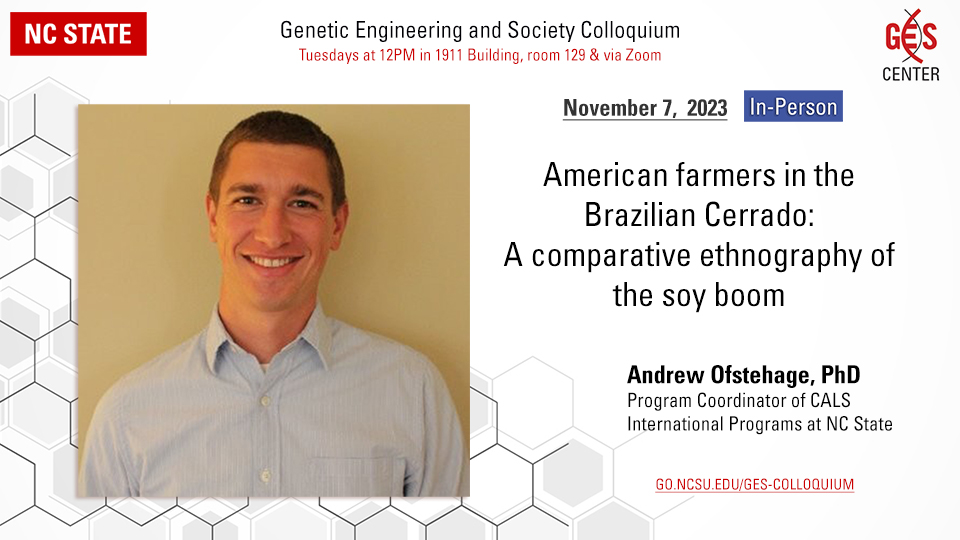
- This event has passed.
Andrew Ofstehage—American farmers in the Brazilian Cerrado: A comparative ethnography of the soy boom | GES Colloquium

Colloquium Home | Zoom Registration | GES Video Library (current) | Video Archives | Podcast | @GESCenterNCSU | Newsletter
American farmers in the Brazilian Cerrado: A comparative ethnography of the soy boom
Andrew Ofstehage, Program Coordinator of CALS International Programs at NC State University
A look at the farming strategies of two communities of North American farmers in Brazil and how they make sense of thorny subjects such as farmland financialization, genetically-engineered crops, and labor management.
Download seminar poster
Abstract
This talk focuses on a comparative ethnography of two groups of transnational soybean farmers in the Brazilian Cerrado. In 1968, Holdeman Mennonites embarked on a tour of rural Brazil. In search of autonomy, they found cheap farmland in Rio Verde, Goiás and encountered a government eager for their migration. Decades later, a group of Midwestern family farmers toured rural Brazil and found cheap, expansive farmland. They courted investors (mostly neighboring farmers), bought massive tracts of land, and settled in Luis Eduardo Magalhães, Bahia. The two groups’ migrations began with experiences of crisis: for the Mennonites, a cultural crisis in the United States that threatened their family and community reproduction and for the Midwestern family farmers a farm crisis which threatened their livelihoods. In Brazil, they adopted common farming techniques related to soil fertilization and tillage, yet differed in crop rotations, use of technology, and most starkly in their perceptions of what counted as “good farming.” Each community internally contested identity and value as they made meaning out of transnational lives and industrial farming. Their negotiation of agronomic factors, cultural preferences, and the economics of producing soy in Brazil demonstrates the interconnectivity of social and material factors in agriculture.
Related links:
- Andrew Ofstehage. (2018), Farming out of place:. American Ethnologist, 45: 317-329. https://doi.org/10.1111/amet.12667
- Andrew Ofstehage (2016) Farming is easy, becoming Brazilian is hard: North American soy farmers’ social values of production, work and land in Soylandia, The Journal of Peasant Studies, 43:2, 442-460, DOI: 10.1080/03066150.2014.998651
Speaker Bio
Dr. Andrew Ofstehage is currently a program coordinator at NC State; previously, he was a postdoctoral associate at Cornell University. He completed his PhD in Anthropology in 2018 at the University of North Carolina at Chapel Hill where he defended his dissertation, “‘When We Came There Was Nothing’: Land, Work, and Value among Transnational Soybean Farmers in the Brazilian Cerrado.” His research among transnational soybean farmers in Brazil incorporates training in agronomy and anthropology and asks how transnational farmers engage with soils and landscapes in Brazil; become managers of workers and investors; and create and re-create agrarian communities out of place. He is now conducting new research on the bio-cultural life of soy consumption in the United States, planning new work on the socio-material life of soil, and continuing ethnographic research with transnational soy farmers in Brazil.
GES Colloquium is jointly taught by Drs. Jen Baltzegar and Dawn Rodriguez-Ward, who you may contact with any class-specific questions. Colloquium will be held in person in the 1911 Building, room 129, and live-streamed via Zoom.
Please subscribe to the GES newsletter and Twitter for updates.
WordPress database error: [Unknown column 'wp_tec_occurrences.start_date' in 'SELECT']SELECT SQL_CALC_FOUND_ROWS wp_posts.*, CAST( wp_tec_occurrences.start_date AS DATETIME ) AS event_date
FROM wp_posts LEFT JOIN wp_term_relationships ON (wp_posts.ID = wp_term_relationships.object_id) LEFT JOIN wp_postmeta ON ( wp_posts.ID = wp_postmeta.post_id AND wp_postmeta.meta_key = '_EventHideFromUpcoming' ) LEFT JOIN wp_postmeta AS mt1 ON ( wp_posts.ID = mt1.post_id )
WHERE 1=1 AND wp_posts.ID NOT IN (19256) AND (
wp_term_relationships.term_taxonomy_id IN (149,521,802)
OR
wp_term_relationships.term_taxonomy_id IN (45,47)
) AND (
wp_postmeta.post_id IS NULL
AND
( mt1.meta_key = '_EventStartDate' AND CAST(mt1.meta_value AS DATETIME) >= '2026-02-13 09:34:21' )
) AND wp_posts.post_type IN ('post', 'page', 'attachment', 'tribe_venue', 'tribe_events', 'tribe_event_series') AND ((wp_posts.post_status = 'publish'))
GROUP BY wp_tec_occurrences.occurrence_id
ORDER BY event_date ASC, wp_posts.post_date ASC
LIMIT 0, 3